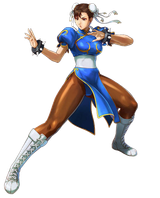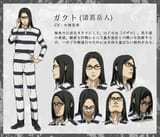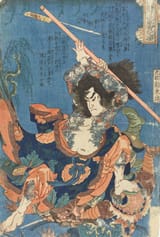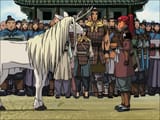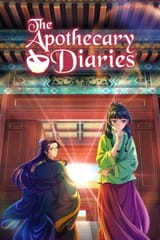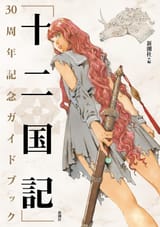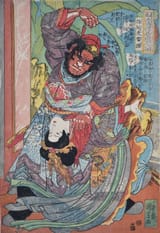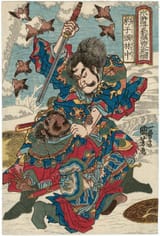do you think there are japanese and korean sinoboos (fanboys of ancient chinese civilization like han dynasty) kind of like how there are romeaboos in anglo/germanic and slavic countries? are there japanese or koreans who think of themselves as filthy barbarians civilized by the glorious ancient china?
after all, ancient greece and rome is to western civilization as china is to eastern
Anonymous
 8/11/2025, 7:23:35 AM
No.213693038
>>213693282
8/11/2025, 7:23:35 AM
No.213693038
>>213693282
>>213692989 (OP)
Its like asking if there are Europeans that thinm they got civilized by the Israelis. Even if its a fact, nobody admits it
Anonymous
 8/11/2025, 7:25:36 AM
No.213693065
8/11/2025, 7:25:36 AM
No.213693065
I'm interested in Chinese history but I'm not a boo
Anonymous
 8/11/2025, 7:28:40 AM
No.213693115
>>213693135
8/11/2025, 7:28:40 AM
No.213693115
>>213693135
Historical context shows a nuanced and complex relationship between Korea, Japan, and China, where all three nations, at different times and to varying degrees, influenced each other and perceived themselves in relation to each other, not always in terms of inferiority or superiority.
Korea
Sinocentrism: Historically, Koreans, particularly during the Joseon Dynasty, adopted a worldview in which China was considered the center of the civilized world, and Korea (Joseon) considered itself a loyal adherent to Chinese culture and ranked next to China in this hierarchy. In this view, nations outside the Quora says "China-centric world system" were considered barbaric. Close adherence to Chinese cultural norms was a source of pride for Koreans.
Small Sinocentrism: However, following the Manchu conquest of China, Korean elites developed the concept of "small Sinocentrism," in which Korea became the true guardian of authentic Chinese civilization, while the Qing were viewed as barbarians who had corrupted Chinese tradition. This allowed Korea to maintain its cultural pride while formally accepting its vassal status to China.
Cultural borrowing and adaptation: Korea's culture was substantially influenced by China in areas like writing, art, architecture, political systems, and religion. However, Koreans adapted these elements to fit their own needs and context. For instance, while Korea introduced civil service examinations modeled after China's, unlike China, only aristocrats could take the exam. Korea also invented its own writing system, Hangul, despite the earlier adoption of Chinese characters.
Anonymous
 8/11/2025, 7:29:40 AM
No.213693128
8/11/2025, 7:29:40 AM
No.213693128
Japan
Cultural borrowing and selective adoption: Japan also adopted many aspects of Chinese culture, including the writing system, Buddhism, Confucian ideas, and even city planning, like the layout of Nara which was modeled after the Chinese capital of Chang'an. According to Wikipedia, Japanese national clothing, the Kimono, was significantly inspired by Chinese clothing styles and traditions.
Maintaining independence and unique identity: However, Japan was more selective in its adoption of Chinese culture and consciously maintained its political independence, even while acknowledging the cultural superiority of China. For instance, when corresponding with the Chinese Emperor, Japan's ruler adopted the title of "Emperor," implying a status equal to the Chinese Emperor. In contrast to Korea, Japan controlled its intake of cultural influence from China, notes Wikipedia.
Modern sentiments: Modern Japanese sentiments towards ancient China can be complex. Some view ancient China's culture and achievements with admiration, recognizing its impact on Japan's cultural heritage. However, negative sentiment towards China has persisted due to historical disputes and nationalistic sentiments.
Conclusion
While both Korea and Japan were significantly influenced by ancient Chinese civilization and at various times showed admiration for its cultural and political achievements, it's a simplification to say that either nation viewed themselves solely as "filthy barbarians" or were mere "Sinoboos." They were both borrowers of Chinese culture, but adapted and integrated these influences into their own distinct societies, maintaining their own unique identities and sometimes even asserting their independence or rivalry with China. The historical relationships were complex, involving periods of both admiration and conflict, according to The Atlantic.
Anonymous
 8/11/2025, 7:32:21 AM
No.213693165
8/11/2025, 7:32:21 AM
No.213693165
>>213692989 (OP)
No, I like American culture much better.I think most young people in China feel the same way.
Anonymous
 8/11/2025, 7:32:27 AM
No.213693168
8/11/2025, 7:32:27 AM
No.213693168
>>213692989 (OP)
It's a fad.
In a few years, they will be into another fashion.
Anonymous
 8/11/2025, 7:38:18 AM
No.213693257
>>213693365
8/11/2025, 7:38:18 AM
No.213693257
>>213693365
>>213692989 (OP)
Yes. One of the most popular themes of isekai for Jap women is being transported to some ancient Chinese palace to become a consort/physician. Why in fuck they like it so much is baffling, it's like wanting to be some bitch in an ISIS harem
Anonymous
 8/11/2025, 7:38:31 AM
No.213693263
>>213693319
8/11/2025, 7:38:31 AM
No.213693263
>>213693319
>>213692989 (OP)
there were, they are extremely rare
japanese basically pretend china doesn't exist
Anonymous
 8/11/2025, 7:39:27 AM
No.213693282
8/11/2025, 7:39:27 AM
No.213693282
>>213693038
I want to have whatever it is that you're smoking. Did you mean Phoenicians? Israel didn't exist 80 years ago and Jews first came in Europe about 800 years after the foundation of Rome.
>>213693257
give me some examples, I want to read them
Anonymous
 8/11/2025, 7:50:09 AM
No.213693452
>>213693479
8/11/2025, 7:50:09 AM
No.213693452
>>213693479
>>213693365
not him but 12 kingdoms is inspired by china, but it's not china
Anonymous
 8/11/2025, 7:50:20 AM
No.213693457
>>213693552
8/11/2025, 7:50:20 AM
No.213693457
>>213693552
>>213693365
Not that anon but here is one
Anonymous
 8/11/2025, 7:55:04 AM
No.213693534
>>213693684
8/11/2025, 7:55:04 AM
No.213693534
>>213693684
>>213692989 (OP)
I always wonder, how do Japanese see Chinese outside of contemporary politics?
Online I read that Japanese are offended about Chinese for "cultural reasons" (?) but they say they have more in common with them than g*ijin.
It's hard to trust what Japanese here even say, because every single one I see here dreams about fucking a blonde gaijin girl.
Anonymous
 8/11/2025, 7:56:03 AM
No.213693552
8/11/2025, 7:56:03 AM
No.213693552
>>213693457
Wait nvm this isn’t an isekai
Anonymous
 8/11/2025, 8:06:04 AM
No.213693684
8/11/2025, 8:06:04 AM
No.213693684
>>213693534
mainland chinese tourists are looked down upon
taiwanese are respected though, sometimes seen as honorary japs
Anonymous
 8/11/2025, 10:30:02 AM
No.213695831
>>213696011
8/11/2025, 10:30:02 AM
No.213695831
>>213696011
>>213692989 (OP)
In Korea, a lot of people are obsessed with *Romance of the Three Kingdoms*, and if someone says they're interested in China, it’s usually that. They name their game usernames or DC Inside nicknames things like “Zhuge Liang,” “Sun Ce,” or “Zhou Yu.”
Anonymous
 8/11/2025, 10:41:08 AM
No.213696011
8/11/2025, 10:41:08 AM
No.213696011
>>213695831
three kingdoms is at bare minimum for early millennials and above, and even then, what they are interested in is Japanese video games based on Three Kingdoms, not actual Chinese culture.
Anonymous
 8/11/2025, 11:38:52 AM
No.213697117
>>213697348
8/11/2025, 11:38:52 AM
No.213697117
>>213697348
>>213692989 (OP)
Akira Toriyama was almost certainly a sinoboo and was even friends with Jackie Chan. He made a manga and anime about the monkey king after all.
Anonymous
 8/11/2025, 11:50:18 AM
No.213697348
8/11/2025, 11:50:18 AM
No.213697348
>>213697117
I’ve always got the impression it was more popular in the past because of stuff like that, makes me wonder if they westernised things for a wider audience (massive number of DBZ fans have no idea about the journey to the west link) or just moved away from it naturally over time
Anonymous
 8/11/2025, 12:06:10 PM
No.213697702
8/11/2025, 12:06:10 PM
No.213697702
>>213692989 (OP)
Every time there is a civil war or even any kind of popular conflict, the Chinese, Japanese, and Koreans will LARP as characters from the either Romance of the 3 Kingdoms, Water Margin, or the Warring States era.
 8/11/2025, 7:20:05 AM
No.213692989
>>213693038
>>213693165
>>213693168
>>213693257
>>213693263
>>213693534
>>213695551
>>213695831
>>213697117
>>213697702
8/11/2025, 7:20:05 AM
No.213692989
>>213693038
>>213693165
>>213693168
>>213693257
>>213693263
>>213693534
>>213695551
>>213695831
>>213697117
>>213697702
